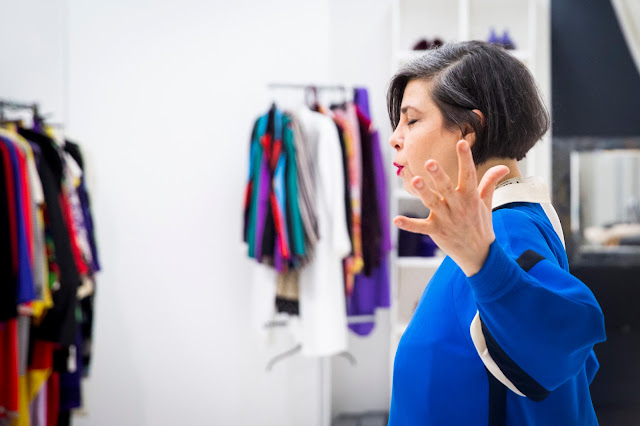Review: Solo Show "This Would Look Good on You" Is Impeccably Tailored
This Would Look Good on You
Written and performed by Orietta Crispino
Directed by Liza Cassidy
Presented at Theaterlab, 357 W 36th St., 3rd Floor, Manhattan, NYC
September 23-October 3, 2021
Masking and proof of vaccination required
 |
| Orietta Crispino. Photo credit: Gaia Squarci |
As Crispino, playing a version of herself, unpacks storage bins and pulls designer dresses from hangers, items spark different memories and associations, simultaneously unpacking parts of her past and self. Her deceased mother, for instance, looms large in the early part of the show, as someone who gifted her many garments during her life and left her more upon her passing. The show is not, however, interested in establishing some sort of chronological life story; rather, it moves with a stream-of-consciousness fluidity among various reminiscences, effusions, and reflections. She at one point wonders where she herself is in all these clothes, and how we define ourselves and are defined by others represents one thread that runs throughout This Would Look Good on You: Did she like yellow because she liked yellow or because she liked what became familial lore about her preference? When it becomes a workplace tradition for her coworkers to give her gifts of something purple, what does it say about those relationships? Are we that readily reducible/reduced to a single "interest" or taste? (And who hasn't experienced this situation, whether with coworkers, friends, or family?) What does it suggest not only about her personal history and aspirations but also about the class coding and boundaries linked to clothing when she says that she never went anywhere that would justify wearing a couture dress that made about three-quarters of the audience gasp?
 |
| Orietta Crispino. Photo credit: Gaia Squarci |
 |
| Orietta Crispino. Photo credit: Gaia Squarci |
Beauty may have a lot of work surrounding it, and silk may be demanding, as Crispino tells us, but her performance appears effortless. She creates an intimacy with the audience that destabilizes the line between performer and performance (not wholly unlike what Prospero's epilogue accomplishes) while fashioning a distinctive and authentic character.
So don't miss your chance to pull something out of your closet one day and experience a rush of memory: "This is what I wore to This Would Look Good on You!"
John R. Ziegler and Leah Richards



Comments
Post a Comment